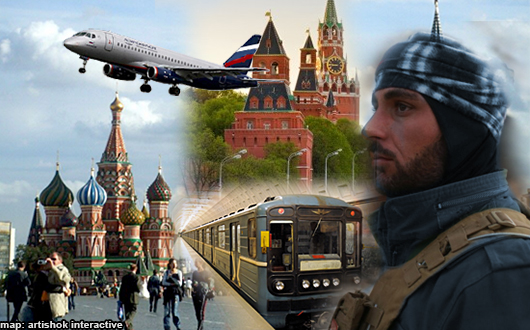Next Stop for ISIS: Moscow or St. Petersburg
The Islamic State is expected by well-informed observers to follow up on its Brussels terror coup with an attack on a major Russian city, probably Moscow or Saint Petersburg, say DEBKA Weekly’s intelligence and counterterrorism sources.
Both ISIS planners and Russia’s FSB security service are treating the November 2015 attacks in Paris, the North Africa terror operations and this week’s bombing attacks in Brussels as the prelude to a terrorist assault on a central Russian target.
Western terrorism experts deduce that the jihadists drew lessons from all these episodes and upgraded their capabilities accordingly, before striking on Russian soil.
At a meeting with senior FSB operatives on Feb. 26, Russian President Vladimir Putin called on the agency to closely monitor people arriving in the country as refugees or traveling onward to Europe. He stressed that the European Union migrant crisis “had nothing to do with Russia’s actions in Syria (in answer to allegations by the NATO commander in Europe earlier this month that Putin had deliberately generated a refugee crisis in Syria in order to “break” Europe).
“Control over the flows of refugees heading both to Russia and also on transit to Europe must be tightened,” the Russian president said.
FSB Director Alexander Bortnikov said on March 23, the day after the Brussels bombings: “Threats of terrorist attacks exist in Russia, but the security services are monitoring the situation and it is currently under control as of today.” He added, “There are no absolute guarantees, but I think that we can say now that terrorist activities in the country are being uncovered and stopped in a timely manner."
The Russian government and security-related officials have evidently gone further than their colleagues in France and Belgium in the preventive steps they have taken for forestalling possible attacks – although they, too, are offering no guarantee of success:
1. On March 1, Russian authorities launched an anti-terrorist operation and a hunt for dangerous individuals in the Derbentsky district of the Russian republic of Dagestan. Dagestan is part of the predominantly Muslim North Caucasus Federal District that includes Chechnya, Ingushetia, the Stavropol Territory, North Ossetia, the Karachay-Cherkess Republic and Kabardino-Balkaria.
The FSB were looking for at least three terror networks believed to be lurking in one or more of the seven republics and preparing to strike a major Russian city, or conduct a number of coordinated attacks in several cities, on orders from the ISIS Syrian command center in Raqqa.
Presumed targets are airliners, airports, trains, subways, city centers, large-scale events and government offices.
2. Security authorities have placed Russia on maximum terror alert and deployed reinforced security patrols at key points in the main Russian cities.
3. To avoid giving the jihadists a pretext for retaliation, Russia has halted its air strikes against Raqqa and other ISIS targets in Syria, as well as offering ISIS a carrot.
(See the separate article: “Russia Lets ISIS Into Southern Syria to Bring Assad into Line in Geneva.”)
But the Russian stick was also brandished on Wednesday, March 23, when Russian supreme commander in Syria, Col. Gen. Alexander Dvornikov, offered in unusual detail a rundown of the tasks assigned to the Spetsnaz Special Operations contingents left in Syria after the Russian military drawdown.
Clearly, those troops will be on hand for immediate reprisals against ISIS in Syria should the terrorists venture to attack Russia.


